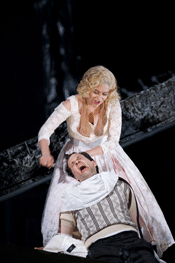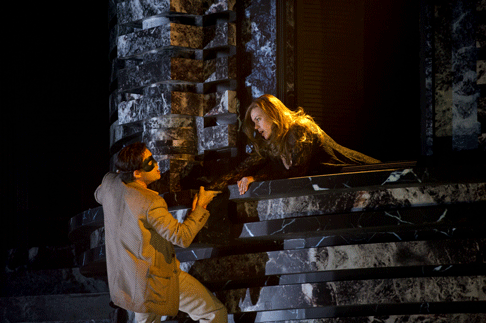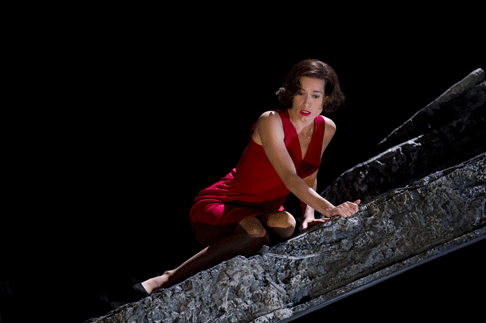![Gerald Finley as Don Giovanni [Photo by Bill Cooper courtesy of Glyndebourne]](http://www.operatoday.com/Don-Giovanni-GFO-2010-009.gif)
12 Jul 2010
A Magnificent Don Giovanni at Glyndebourne
Don Giovanni isn't new and most of the cast at Glyndebourne (led by Gerald Finley) are familiar.
English Touring Opera are delighted to announce a season of lyric monodramas to tour nationally from October to December. The season features music for solo singer and piano by Argento, Britten, Tippett and Shostakovich with a bold and inventive approach to making opera during social distancing.
This tenth of ten Live from London concerts was in fact a recorded live performance from California. It was no less enjoyable for that, and it was also uplifting to learn that this wasn’t in fact the ‘last’ LfL event that we will be able to enjoy, courtesy of VOCES8 and their fellow vocal ensembles (more below …).
Ever since Wigmore Hall announced their superb series of autumn concerts, all streamed live and available free of charge, I’d been looking forward to this song recital by Ian Bostridge and Imogen Cooper.
The Sixteen continues its exploration of Henry Purcell’s Welcome Songs for Charles II. As with Robert King’s pioneering Purcell series begun over thirty years ago for Hyperion, Harry Christophers is recording two Welcome Songs per disc.
Although Stile Antico’s programme article for their Live from London recital introduced their selection from the many treasures of the English Renaissance in the context of the theological debates and upheavals of the Tudor and Elizabethan years, their performance was more evocative of private chamber music than of public liturgy.
In February this year, Albanian soprano Ermonela Jaho made a highly lauded debut recital at Wigmore Hall - a concert which both celebrated Opera Rara’s 50th anniversary and honoured the career of the Italian soprano Rosina Storchio (1872-1945), the star of verismo who created the title roles in Leoncavallo’s La bohème and Zazà, Mascagni’s Lodoletta and Puccini’s Madama Butterfly.
Evidently, face masks don’t stifle appreciative “Bravo!”s. And, reducing audience numbers doesn’t lower the volume of such acclamations. For, the audience at Wigmore Hall gave soprano Elizabeth Llewellyn and pianist Simon Lepper a greatly deserved warm reception and hearty response following this lunchtime recital of late-Romantic song.
Collapsology. Or, perhaps we should use the French word ‘Collapsologie’ because this is a transdisciplinary idea pretty much advocated by a series of French theorists - and apparently, mostly French theorists. It in essence focuses on the imminent collapse of modern society and all its layers - a series of escalating crises on a global scale: environmental, economic, geopolitical, governmental; the list is extensive.
For this week’s Live from London vocal recital we moved from the home of VOCES8, St Anne and St Agnes in the City of London, to Kings Place, where The Sixteen - who have been associate artists at the venue for some time - presented a programme of music and words bound together by the theme of ‘reflection’.
'Such is your divine Disposation that both you excellently understand, and royally entertaine the Exercise of Musicke.’
Amongst an avalanche of new Mahler recordings appearing at the moment (Das Lied von der Erde seems to be the most favoured, with three) this 1991 Mahler Second from the 2nd Kassel MahlerFest is one of the more interesting releases.
‘And there was war in heaven: Michael and his angels fought against the dragon; and the dragon fought and his angels, And prevailed not; neither was their place found any more in heaven … that old serpent … Satan, which deceiveth the whole world: he was cast out into the earth, and his angels were cast out with him.’
If there is one myth, it seems believed by some people today, that probably needs shattering it is that post-war recordings or performances of Wagner operas were always of exceptional quality. This 1949 Hamburg Tristan und Isolde is one of those recordings - though quite who is to blame for its many problems takes quite some unearthing.
There was never any doubt that the fifth of the twelve Met Stars Live in Concert broadcasts was going to be a palpably intense and vivid event, as well as a musically stunning and theatrically enervating experience.
‘Love’ was the theme for this Live from London performance by Apollo5. Given the complexity and diversity of that human emotion, and Apollo5’s reputation for versatility and diverse repertoire, ranging from Renaissance choral music to jazz, from contemporary classical works to popular song, it was no surprise that their programme spanned 500 years and several musical styles.
The Academy of St Martin in the Fields have titled their autumn series of eight concerts - which are taking place at 5pm and 7.30pm on two Saturdays each month at their home venue in Trafalgar Square, and being filmed for streaming the following Thursday - ‘re:connect’.
The London Symphony Orchestra opened their Autumn 2020 season with a homage to Oliver Knussen, who died at the age of 66 in July 2018. The programme traced a national musical lineage through the twentieth century, from Britten to Knussen, on to Mark-Anthony Turnage, and entwining the LSO and Rattle too.
With the Live from London digital vocal festival entering the second half of the series, the festival’s host, VOCES8, returned to their home at St Annes and St Agnes in the City of London to present a sequence of ‘Choral Dances’ - vocal music inspired by dance, embracing diverse genres from the Renaissance madrigal to swing jazz.
Just a few unison string wriggles from the opening of Mozart’s overture to Le nozze di Figaro are enough to make any opera-lover perch on the edge of their seat, in excited anticipation of the drama in music to come, so there could be no other curtain-raiser for this Gala Concert at the Royal Opera House, the latest instalment from ‘their House’ to ‘our houses’.
"Before the ending of the day, creator of all things, we pray that, with your accustomed mercy, you may watch over us."
![Gerald Finley as Don Giovanni [Photo by Bill Cooper courtesy of Glyndebourne]](http://www.operatoday.com/Don-Giovanni-GFO-2010-009.gif)
Don Giovanni isn't new and most of the cast at Glyndebourne (led by Gerald Finley) are familiar.
What is "news" however, is the amazing production of Don Giovanni at Glundebourne, a work of art in itself. Wonderful orchestra, wonderful set, fully supporting the music and drama.
Jonathan Kent and set designer Paul Brown created the astounding Purcell Fairy Queen at Glyndebourne in 2009, so there was no chance this new production of Don Giovanni would be dull. Think about who Don Giovanni is. He’s always one step ahead, adapting and changing, always on the move. Kent and Brown take their cue from the opera and its music.
 Anna Virovlansky as Zerlina and Luca Pisaroni as Leporello
Anna Virovlansky as Zerlina and Luca Pisaroni as Leporello
As we sat waiting for the performance to start, the theatre at Glyndebourne was suddenly plunged into total darkness. A power cut? No, this was theatre, in every sense. Gradually golden light picks out the orchestra. It’s a beautiful image, burnished instruments, musicians moving as in a ballet. Immediately, attention is focused on the music, as it should be.
The Orchestra of the Age of Enlightenment is one of the finest period orchestras in Europe. Historically-informed performance is valuable in Don Giovanni, not because it’s authentic whatever that might be, but because it creates lighter textures, reflecting the elegant, flexible movement in the music.
Then, instead of a conventional set, there’s a giant rotating cube, a square globe, so to speak, which contains “the world”. It unfolds, reshaping and reinventing itself: a box of tricks, like Don Giovanni himself. Because it’s meticulously designed the cube moves quickly and silently. it’s much less intrusive than conventional set changes. Major transformations take place during the interludes, so they don’t get in the way. This amazing set frees the action from technical limitations. allowing the drama to unfold, rapid-fire and free.
At first the cube reveals its secrets slowly. A crack appears. It’s a narrow alleyway. Don Giovanni is trapped like a rat, so he lashes out and kills the Commendatore..The cube closes again, its outer walls like a stone building. Later, the cube opens to reveal a sunlit garden, complete with trees. It’s the peasant wedding. So many shifts of focus. Garden transforms to ballroom, Zerlina’s loyalties shift, the masked visitors move in on Don Giovanni.
Conflagration ends the First Act. While the crowd converge on Don Giovanni, Don Ottavio points at objects, just like the Commendatore will later point at Don Giovanni. For now, it’s just the furniture that goes up in flames. Real flames, you can smell the gas. It feels dangerous, even though you know Glyndebourne (and its insurers) have checked it all out thoroughly. We know Don Giovanni will end up in hell, but seeing him circled by fire is dramatic. It’s entirely consistent with the turbulent music with which Mozart marks the beginning of Don Giovanni’s end.
 Gerald Finley as Don Giovanni and Anna Samuil as Donna Anna
Gerald Finley as Don Giovanni and Anna Samuil as Donna Anna
In the Second Act, the giant cube is transformed, as if it’s exploded. Don Giovanni’s clever stratagems are beginning to shatter. Instead of neat panels, wild diagonal planes, sharp angles, knife edges, if you will. Violence is implicit. The pace quickens, the orchestral playing with great agility. Some of the best singing all evening, too, the cast invigorated. Movement is well blocked, the cast nimbly negotiating the change of position (and costume).
Perched dangerously on the central diagonal plane, Gerald Finley (Don Giovanni) and Luca Pisaroni (Leporello) read the inscription on the Commendatore’s grave. No statue as such, but by this point in the performance the atmosphere of horror is so intense that a device like a talking statue would seem clumsy. As Finley teeters on the dangerous ledge, and Pisaroni cowers in terror, the Commendatore’s voice booms out. Invisible threats are much more frightening.
A golden candelabra on a luxurious table cloth. Don Giovanni’s showing off, trying to impress. . But the table’s on the spot that was the grave. Suddenly, the Commendatore pops up, a corpse in a rotting, blood-stained shroud. Death levels all, rich or poor. The corpse topples the table over, exposing its flimsy structure. Slowly, the corpse moves towards Don Giovanni and zaps him dead. Everyone gasps. A fantastic coup-de-théâtre!
It’s an overpowering image. Thank goodness for the final chorus “Questo è il fin”, where order is restored, and we’re reminded that theatre is glorious illusion.
Magnificent as the set is, this will also be a Don Giovanni to listen to for the orchestra. The Orchestra of the Age of Enlightenment are so good that they can generate almost demonic energy from the lighter timbres of period instruments. Vladimir Jurowski has rarely sounded more inspired, his tendency towards mysticism countered by the brightness of this playing. The music in the ballroom scene was particularly well defined. Trios move throughout this music, so defining the tripartite form in this orchestration is important.
Excellent flow between ensemble and soloists. Musicians of this calibre really make a difference This lutenist sounds truly seductive, and the harpsichord’s spiky interjections signal alertness, because there’s such sharpness of attack.
Gerald Finley’s Don Giovanni is smooth, even a little soft-grained to start with, but then he’s playing a man who achieves his aims by charm. His champagne aria “Fin ch’han dal vino”, didn’t fizzle but perhaps that’s a hint that Don Giovanni’s pursuit of pleasure is ultimately hollow.
When Don Giovanni’s trapped, he’s most lethal. In the Second Act, Finley’s voice darkens malevolently, yet he also manages to express the vulnerability in Don Giovanni’s character. Does he really enjoy seduction, or is it obsession? Perhaps women are attracted because they sense that need in him.
But the operas isn’t Don Giovanni’s alone. Luca Pisaroni’s Leporello made the dynamic between master and servant powerfully pungent. At Glyndebourne, you sometimes can’t tell patrons from waiters, they’re all in the same uniform, which adds extra piquancy to Mozart’s subversive undercurrents.
The interaction between Finley and Pisaroni is very carefully timed, superb vocal rapport. Pisaroni’s Leporello is no put-upon fool, he pulls the strings.. Very muscular, assertive singing, masterful in every way. At the end, Pisaroni’s Leporello takes a photo of his master’s corpse. Does he, too, have a “stud book” of past conquests?
 Kate Royal as Donna Elvira
Kate Royal as Donna Elvira
The friend with whom I attended this performance has heard Cesare Siepi, Elizabeth Schwarzkopf and many others in this opera, but he doesn’t judge singers in isolation as if they were lab specimens. Context matters, too. “These female singers are more like real women”, he said, “not divas doing a role”. It’s a generous comment, as Kate Royal’s Donna Elvira is just too big for her, and Anna Samuil’s Donna Anna, though good in general, won’t go down in history. Though given the performance history of this opera, that’s a tall order.
Anna Virovlansky’s Zerlina stood out, vocally firm and bright, physically vivacious and energetic..There she is, up against a wall with Don Giovanni, eagerly co-operating. Confronted by Masetto (Guido Loconsolo) she begs him to beat her. Virovlansky makes it sound wildly kinky, hinting at the darker aspects of Zerlina’s personality.
Glyndebourne performances sell out quickly, so there’s almost no chance of getting tickets other than returns. Get involved now, to be ready for 2011. But there’s a lot more to Glyndebourne than attending its summer season.
Glyndebourne’s significance is immeasurably greater than its seating capacity. It’s a small house, but it produces work of such high quality that it easily competes with many larger companies. Anyone seriously interested in European opera needs to be aware of Glyndebourne. These days, all opera houses need to extend their coverage beyond core live performance. Not everyone can attend in person, but broadcasts, DVDs, licensing, all help to ensure the financial health of the house., and extend its audience around the world.
Glyndebourne’s Don Giovanni is being screened on BBCTV2 at Christmas, and on Medici TV. A DVD release is likely.
For more information, please see the Glyndebourne site.
Anne Ozorio